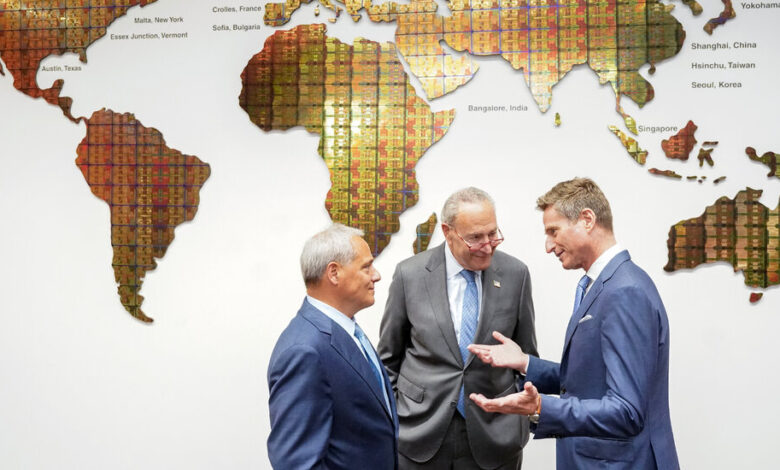
In his efforts to boost American manufacturing and reduce reliance on China, Senator Chuck Schumer has strategically used his political influence to secure funding for New York projects. Schumer, the Senate majority leader, has actively lobbied for investments in the semiconductor industry, urging industry titans to invest in his home state. His goal is to bring funding and investment to New York, reviving factory towns and boosting local political support.
Schumer’s push to secure funding comes at a crucial time when the United States is preparing to invest billions of dollars in the semiconductor industry. The Biden administration plans to invest in chip manufacturing across the country to decrease dependence on foreign factories and enhance national security. Schumer sees these investments as an opportunity to strengthen America’s technological capabilities and create economic opportunities in New York.
However, critics have raised concerns about the role of political influence in determining investment decisions. While it is important to prioritize economic and strategic factors, Schumer’s efforts highlight the influence that powerful political figures can have in shaping industrial policy. Skepticism remains about the impact of political players on investment decisions and the need to keep industrial policy away from pork barrel politics.
New York stands to become a major hub for chip production if the proposed investments materialize. Companies like GlobalFoundries, IBM, Onsemi, and Wolfspeed are already seeking funds to build or expand facilities in the state. Micron Technology plans to invest up to $100 billion over two decades to build the largest high-tech chip facility in the United States, potentially employing thousands of people.
In addition to chip production, Schumer is pushing for New York to play a leading role in semiconductor research, aiming to establish a new federal chip research organization in the state.
Competition for federal funding is expected to be intense, with hundreds of companies expressing interest. The Commerce Department will be responsible for distributing the funds and has set up a selection committee to ensure fairness and avoid favoritism.
While Schumer emphasizes that New York’s merits will speak for themselves, his position as majority leader gives him added influence in attracting investment. Schumer promotes New York’s strengths, such as skilled workers, ample water supply, cheap hydropower, and available shovel-ready sites for companies to establish their operations.
His efforts have led to significant progress, including securing an investment tax credit in the chips legislation and passing a state chips subsidy bill. These measures incentivize companies like Micron to invest in New York and make the economics of the projects feasible.
However, challenges remain. New York has faced setbacks as chip companies like Taiwan Semiconductor Manufacturing Company, Samsung, and Intel chose other locations for their large-scale facilities. Practical considerations, such as the cost of resources, proximity to suppliers, and availability of skilled workers, play a significant role in investment decisions.
As the United States moves forward with its industrial policy, it is crucial to balance the influence of political figures with economic and strategic considerations. While Schumer’s push for funding may benefit New York, it also raises questions about the potential risks of political interference in investment decisions.
Unique Perspective: By strategically using his political influence, Senator Schumer exemplifies the complex dynamics between policymaking and economic development. While his efforts to secure funding for New York projects may bring economic benefits to the state, it also raises concerns about the potential for favoritism and the need for transparent decision-making processes. As industrial policies continue to shape the future of American manufacturing, finding the right balance between political influence and objective decision-making will be crucial to ensure long-term success and competitiveness.




